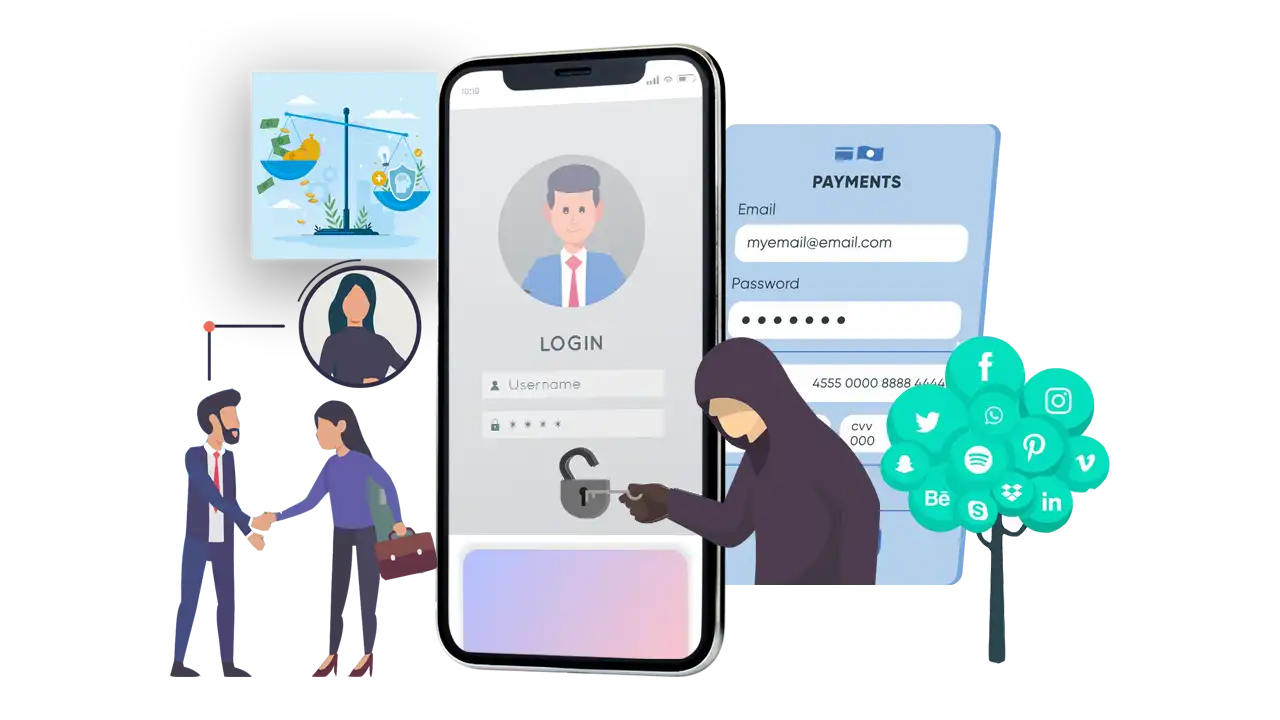Understanding the Importance of Data Privacy in the Digital Age

The internet plays a huge role in our lives. We use it for many things. We buy stuff. We talk to friends. We watch reels and youtube videos. It is really fun and helpful. But we also need to be careful online. Some people can see our private stuff here. This is not good. Bad guys might try to learn your secrets. Not just them but big companies and the government sometimes too.
They might find out your name. They could know where you live. They might see your messages. They could look at your photos. They may know what you watch and buy. This is why your private stuff should stay secret. It is important to keep it safe online.
This article will help you. It will tell you why is data security important. It will show you how others find your information. It will teach you how to hide your personal stuff. You need to understand that your privacy is important and you need to learn how to protect your information. Only then can you have fun and be safe online.
The Value of Data Security

Many companies want this information. They use it to sell you things. They guess what you might want to buy. Then they show you ads. It might seem nice, but it can feel weird. Like someone is always looking at you.
- Identity theft: They could pretend to be you and steal your money! Do you want to get in-depth details about these evil people, how they steal your information, and how to protect yourself? Check out this detailed guide.
- Financial fraud: They could use your bank info to take your money.
- Embarrassment: They could share private photos or messages to embarrass you.
- Stalking/harassment: They could use your location data to find and bother you.
Bad people can use your info too. They might try to trick you. They could pretend to be you online. This is very bad. It’s called stealing who you are. Even the people who make rules might want to know about you. Sometimes this is okay but sometimes it’s too much. It might feel like they’re peeking at you.
Your information can change your future. What if a school looks at your old online words? They might not pick you because of something you said long ago. That’s not fair. Which is why keeping your info private gives you power. You pick who knows about you. It’s like being the boss of your own story. You choose who can read it.
Data security helps you be you. When no one’s watching, you can relax. You can look up things you want to know. You can try new stuff without being scared. It’s not just about you. Your friends share things with you, too. If you are not careful, their private stuff might get out. It’s like keeping a friend’s secret.
Some people say, “We don’t need to hide.” But data security isn’t about hiding bad things. It’s about having a space just for you, like closing the door when you use the toilet. Learning about keeping info safe can seem hard. But it’s worth it. It helps you stay safe online. You can still have fun and talk to friends. You just do it in a smarter way.

Get Started w/ NordVPN Today
- Top-rated VPN for OS unknown
- Ultra-fast speed in US in 2024
- Save 69% off with VPN.com Discount
- Plans starting at $2.99/month
- Rated 4.5/5 on Google Play with over 825,000 reviews
- Rated 4.7/5 on Apple App Store from 6,600 users
The Erosion of Data Security
It’s getting harder to keep our private stuff secret. It’s like our secrets are slowly spilling out. Let’s see why. We use the internet all the time, on phones, computers, and smart home devices. Every time we use these, we leave tiny bits of information. It’s like dropping little crumbs. These crumbs tell our story.
Big companies pick up these crumbs. They use smart computer tricks to gather this info. They learn what we like, where we go, and what we buy. They use this to sell us things. Social media makes it worse. We share lots on Facebook, Instagram, and TikTok. We post pictures and tell where we are. It’s fun, but it means less data security. We’re giving away our private life for free. Bad people try to steal our information using this information. They send fake emails or make fake websites. If we are not careful, then they can even get our passwords or bank info. This can cause big problems.
Some countries watch what people do online. They say it is to keep us safe. But sometimes they watch too much. It feels like they are always looking over our shoulder. New tech can track us too. Face recognition is cool, but it can follow us. Smart speakers might listen more than we think. Even our cars can know where we go.
Internet privacy laws try to help, but it’s hard. The internet changes fast. A new law might not work when things change. And a law in one place might not work in another. Visit this guide to check these laws and how they help to keep our stuff safe and private. We’re part of the problem here, too. We don’t read the rules when we sign up for things. We say “yes” without knowing what we agree to. We trade our privacy for free stuff. It’s like giving our house keys to strangers.
Schools and jobs also look at what we do online. What we post now might cause problems later. A joke from years ago could stop us from getting a job. All this means we have less data security. It’s like our personal space is getting smaller. We have less control over who knows about us. This can make us worried.
But it’s not all bad. People are starting to care more about data security. They’re asking for better rules. And there are also various tools to help protect us online. The main thing that you should do is to be careful. We need to think about what we share. We should learn how to stay safe online. It’s like learning to lock our doors. Our personal info is essential. It is worth keeping safe. We can’t stop all the problems but can try to slow them down. Every little bit helps keep our private life private.
Threats to Data Security

Our private stuff online is in danger. Many things can put our secret information in danger. Let’s look at what these dangers are and why we should care.
Cybercrime and Hacking
Some people try to steal our info. They use tricks to get our passwords and bank details. They might send fake emails or make fake websites. If they get our info, they can take our money or pretend to be us. It is a very severe threat in the online world.
Corporate Data Collection
Big shops and companies collect lots of information about us. They do this when we use their websites or apps. They learn what we buy and like. They use this to show us ads. Sometimes they also sell our information to other companies. This feels like they are taking our privacy away.
Government Surveillance
Some governments look at what people do online. They say it’s to keep us safe. But sometimes they look too much. This can make people feel like they have no privacy. It’s hard to balance safety and privacy.
Social Media Oversharing
We put a lot on Facebook and other sites. We share pictures and tell people where we are. This is fun but can be risky. We give away too much private information. Hackers might use this information in ways we don’t like.
Internet of Things (IoT) Vulnerabilities
Things like smart speakers in our homes collect info about us. If you are curious about how speakers can collect your stuff and want to protect yourself, visit this detailed guide. They make life easier but know much about what we do daily. If not protected well, others might see this info. It’s like having a spy in our house we don’t know about.
Data Breaches
Sometimes, places that have our info get attacked. This is called a data breach. When this happens, lots of people’s private information can be stolen at once. This could be names, addresses, or even bank card numbers. This is a big problem because it hurts many people.
Weak Security Practices
Some people aren’t safe online. Why? Because they use easy passwords or click on unsafe things. This can let hackers get their info. It’s like leaving your house door open – it makes it easy for thieves to come in.
Lack of Digital Literacy
Many people don’t know enough about data security. They don’t understand how to protect their information. This makes it easier for their private stuff to be stolen or used badly.
Third-Party Data Sharing
When we use an app or website, our information might be given to other companies we don’t know. It’s hard to know who has our information or what they are doing with it. This hidden sharing of our info is worrying.
Ultimately, these dangers to our private information are getting bigger and bigger. They affect how safe our stuff is online. We need to know the significance of data and these dangers to protect ourselves. We should be careful about what we share, use strong passwords, and learn more about being safe online. This helps keep our private stuff private.
Protecting Your Data Security

We know that there are many threats out there, but you can use various tools to protect yourself against them:
- Use Privacy Tools: For top-notch online security and privacy, choose NordVPN to keep your data safe and secure. Encrypted messaging apps and privacy-focused browsers are also essential to obscure your online activities from prying eyes.
- Be cautious when sharing personal information: Only provide sensitive information, such as financial information, when absolutely necessary and from trusted sources. Minimize oversharing on social media.
- Tighten Privacy Settings: Most online services and apps offer privacy settings that let you control sharing. Adjust them to provide maximum data security.
- Support Privacy Advocates: Organizations like the Electronic Frontier Foundation champion data security rights. Supporting them empowers wider privacy protections.
- Stay Informed: Continuously learn about new privacy tools, threats, and best practices for safeguarding your sensitive personal information online.
By being proactive, we can all enhance our protection and enjoy a safer, more private internet experience. Apple users are more concerned about their privacy. For more information on securing your Apple devices, visit this page.

Get Started w/ NordVPN Today
- Top-rated VPN for OS unknown
- Ultra-fast speed in US in 2024
- Save 69% off with VPN.com Discount
- Plans starting at $2.99/month
- Rated 4.5/5 on Google Play with over 825,000 reviews
- Rated 4.7/5 on Apple App Store from 6,600 users
Why is Data Security Important?

Data security is about more than just keeping our personal information private. It impacts the core values of human society:
Personal Freedom
Our personal information is an extension of ourselves in the digital world. Having control over that data is essential for maintaining freedom of thought and freedom from surveillance.
Human Rights
The ability to communicate, associate, and express ourselves freely online without improper monitoring is a basic human right that data security upholds.
Trust in Systems
For systems like e-commerce, communications, and civic services to function properly, people must be able to trust that their data will remain private and secure. If we cannot control our info or trust that it will remain private, it fundamentally undermines individual liberty, human rights, and the functioning of modern digital society.
Why Are Some Services Not Prioritizing Data Security?

Most people value it highly, yet many online services, apps, and platforms seem to de-prioritize it in their offerings. Some key reasons for this include:
- Data Monetization: Personal data has immense commercial value in today’s digital economy. Many companies can profit from collecting and exploiting it.
- Convenience Prioritization: Baking strong protections into products can sometimes make them less convenient or harder to use. This is counter to most companies’ aims.
- Resource Constraints: Developing and maintaining rigorous data security capabilities requires constant investment. Smaller companies may lack the resources.
- Lack of Incentives: Without legal requirements or competitive pressures around protection, there is little incentive for companies to prioritize a data privacy-centric approach.
In short, many companies trade off protections in favor of their own interests, be they commercial, user engagement, or resource-driven. Data security is often an afterthought.
Data Security Trends, Challenges, and Solutions
It is changing fast. New trends are shaping how we protect our information. At the same time, we face big challenges. But there are also solutions to help keep our information safe. Let’s look at what’s happening in the world of data security.
Current Trends
- More Privacy Laws: Countries are making new rules to protect people’s information. These laws tell companies how to handle our information. They give us more control over our personal details.
- Privacy-Focused Tech: New tools are being made to help keep our data safe. Things like special browsers and encrypted messaging apps are becoming popular. These help hide our online activities from others.
- Growing Awareness: People are learning more about keeping their information safe. They’re asking questions and wanting to know how their information is used, which is making companies think harder about how they handle our data.
- Data Minimization: Some companies are starting to collect less data. They’re only taking what they really need. This helps reduce the risk of our information being misused.
Challenges
- Fast-Changing Technology: New tech comes out all the time. This makes it hard to keep up with data security. What works today might not work tomorrow.
- Big Data and AI: Companies use powerful computers to analyze lots of data. This can find out things about us we didn’t know we were sharing. It’s hard to keep secrets when computers are so smart.
- Global Nature of the Internet: The internet is used all over the world. But different places have different rules. This makes it tricky to protect information across countries.
- Balancing Privacy and Innovation: We want new, helpful tech. But we also want protection. Finding a balance between these two things is hard for companies and governments.
Solutions
- Strong Encryption: This is like a strong lock for our digital information. It makes it very hard for others to read our data without permission.
- Privacy by Design: This means building protection into products from the start. It’s like making a car with seatbelts already installed.
- Regular Security Updates: Companies need to keep fixing and improving their data security. This helps block new ways for bad people to try to steal data.
- Transparent Data Practices: Companies should be clear about how they use their data. They should tell us in simple words what they’re doing with our information.
- Data Security Officers: More companies are hiring experts to focus on keeping data safe. These people help make sure the company follows the rules.
- User Control Tools: Giving people easy ways to control their protection settings. These could be simple buttons to choose what we share and what we keep private.
- Privacy-Enhancing Technologies: New tech that helps protect privacy while still being useful, such as ways to share data for research without revealing personal details.
- User Education: Many people don’t know about data security. Teaching everyone about online safety is a big job.
Companies and governments need to work together to create better protection. With the right steps, we can enjoy the benefits of technology while keeping our personal information safe. It’s an ongoing process but an important one for everyone in our digital world.
The Future of Data Security

As technology keeps growing, data security will change too. Let’s look at what might happen in the future with our personal information.
Stricter Laws and Rules
More countries will make tough laws about it. These laws will give people more control over their information. Companies will have to be more careful with how they use our data. Breaking these rules could mean big fines or other punishments.
Smart Privacy Tech
New tools will help protect our personal information better. We might see:
- Phones that hide our location better
- Apps that delete our info after we use them
- Computers that keep our files extra safe
These tools will make it harder for others to see our private stuff.
AI for Privacy
Smart computer programs (AI) will help protect our privacy. They might:
- Spot when someone tries to steal our information
- Help us understand complex privacy policies
- Automatically set our privacy settings to keep us safe
Personal Data Control
We’ll have more say in how our information is used. Imagine a dashboard where you can see all your online info. You could choose who sees what, just like picking outfits from your closet.
Data Security as a Selling Point
Companies will use it as a way to attract customers. Just like how some products say “organic,” we might see products saying “privacy-friendly.” This could help us choose services that respect our data.
Education and Awareness
Schools will teach more about online protection. People of all ages will learn how to protect their information. This knowledge will help everyone make smarter choices online.
Decentralized Data Storage
Instead of big companies holding all our information, it might be spread out more. This could make it harder for hackers to steal lots of info at once.
Challenges Ahead
Even with these changes, we’ll face new challenges:
- Keeping up with new tech that could threaten privacy
- Balancing data security with helpful services that need our data
- Making sure protection solutions work for everyone, not just tech experts
The future looks both exciting and challenging. We’ll have better tools and rules to protect our information. But we’ll also need to stay alert and keep learning. By working together – people, companies, and governments – we can create a future where our personal information stays safe and private.

Get Started w/ NordVPN Today
- Top-rated VPN for OS unknown
- Ultra-fast speed in US in 2024
- Save 69% off with VPN.com Discount
- Plans starting at $2.99/month
- Rated 4.5/5 on Google Play with over 825,000 reviews
- Rated 4.7/5 on Apple App Store from 6,600 users
Frequently Asked Questions
What is data privacy?
Data privacy means keeping your personal info safe. It’s about controlling who can see or use your private details.
Why is data privacy important?
It keeps your secrets safe. It stops bad people from using your info to hurt you. It helps you feel safe when you use the internet.
What kind of info should I protect?
Protect things like your name, address, and birthday. Also, keep your passwords, bank details, and health info private.
Can companies sell my data?
Yes, some companies can sell your data. But good privacy laws try to stop this or make them ask you first.
How can I keep my data private?
Use strong passwords. Be careful what you share online. Use privacy settings on your apps and social media.
What should I do if my data is stolen?
Tell the company where it happened. Change your passwords. Watch your bank accounts for strange activity. You might need to tell the police too.
The Bottom Line
In today’s hyper-connected digital age, data security is not just a matter of personal preference. It is a critical necessity. Our ability to control our personal information and preserve privacy online impacts essential human rights like freedom of expression, freedom of thought, and freedom from surveillance. It also allows us to trust and engage in digital ecosystems.
More importantly, strong protections uphold fundamental human values like individual autonomy, human rights, and the ability to engage in society (economically, socially, etc). Without it, we essentially surrender core parts of our individual humanity to platform owners and data exploiters.
The current state of data security is concerning. New technologies and business models based on exploiting personal data are constantly emerging. While convenient, they often come at the cost of our privacy and a degree of our humanity. The tools and awareness to protect our personal information have never been higher. We can use encryption, anonymizing services, and stringent practices to reclaim control over our personal information and digital selves.
Protecting personal information is about more than just keeping information safe. It’s about asserting our fundamental rights as individuals to determine how our personal information and identities are leveraged in an increasingly digitized world. Data security is our digital self-sovereignty. And for humanity to truly embrace the vast opportunities of technological progress while upholding our core values, prioritizing robust security is not just recommended – it is required.
Customer Reviews for NordVPN: In-Depth Review, Tests, and Stats

Connection issues with MLB.TV
May, 2 2023

Prompt customer service
May, 6 2023

I would highly recommend
December, 15 2023



